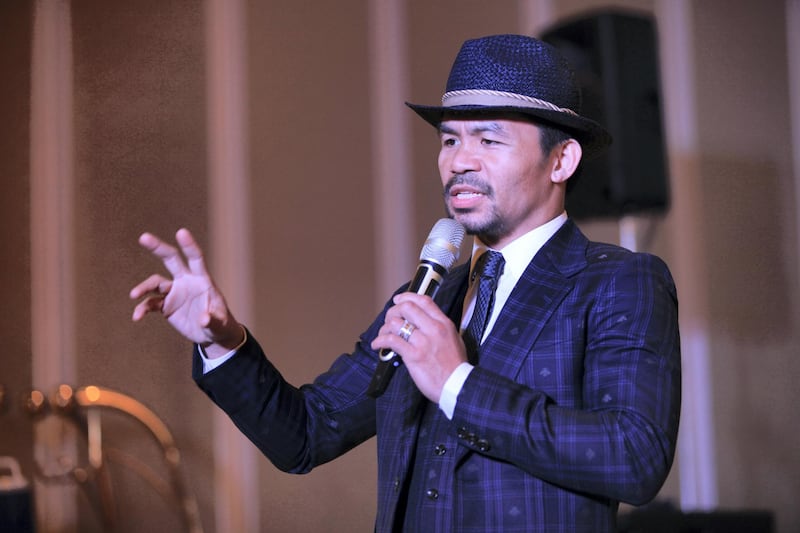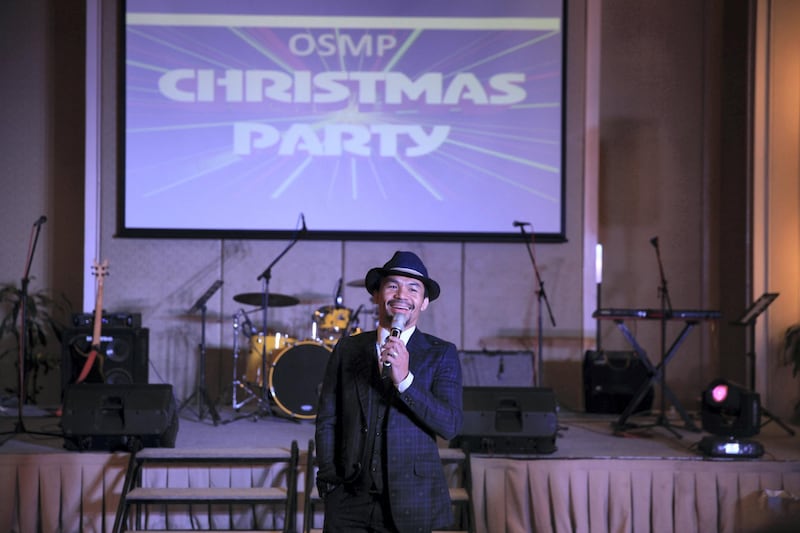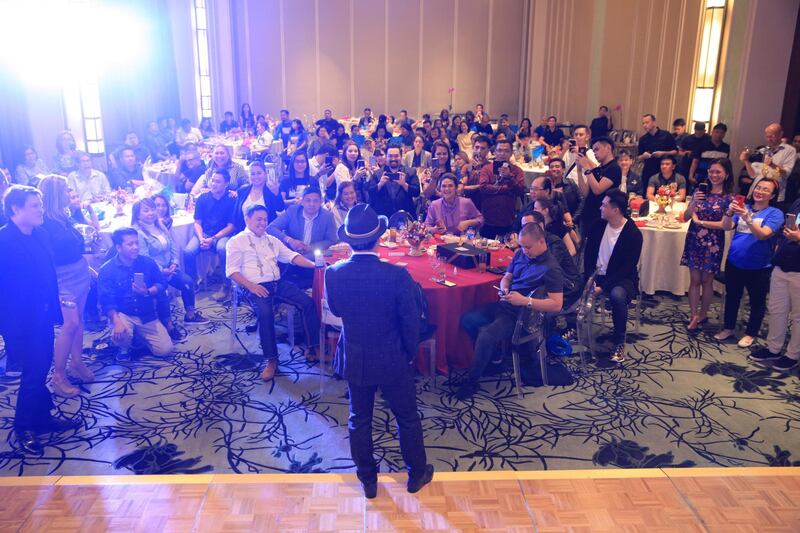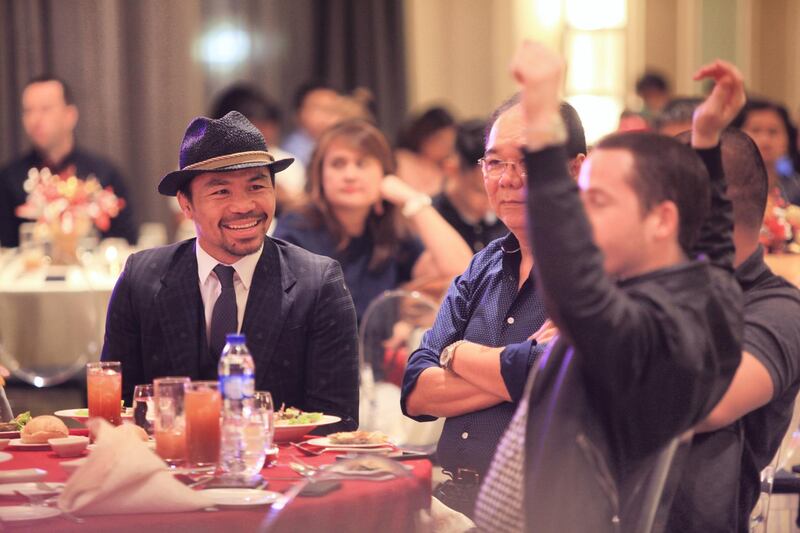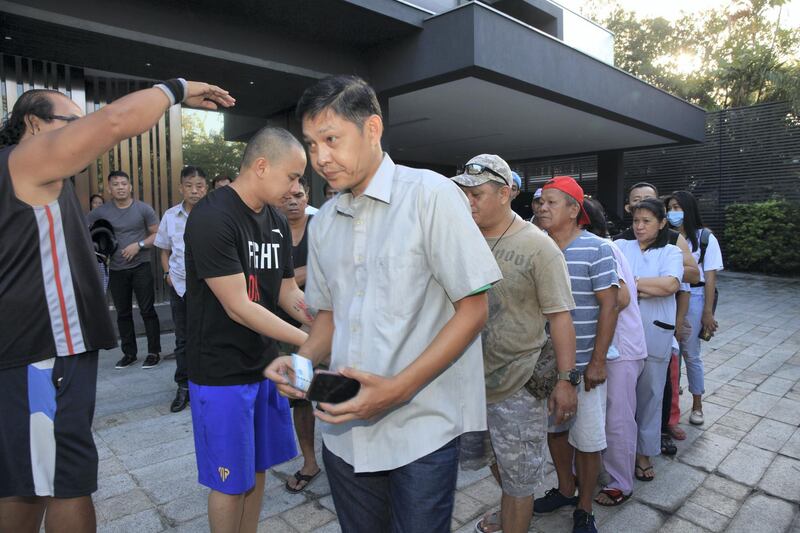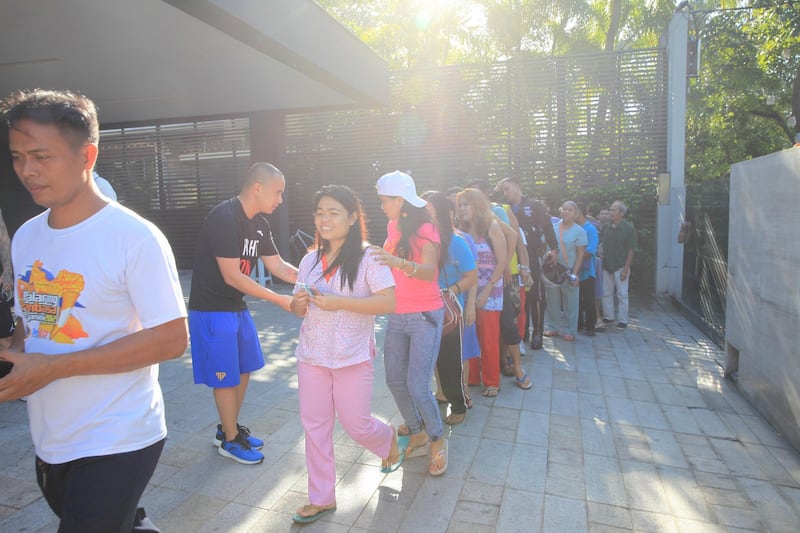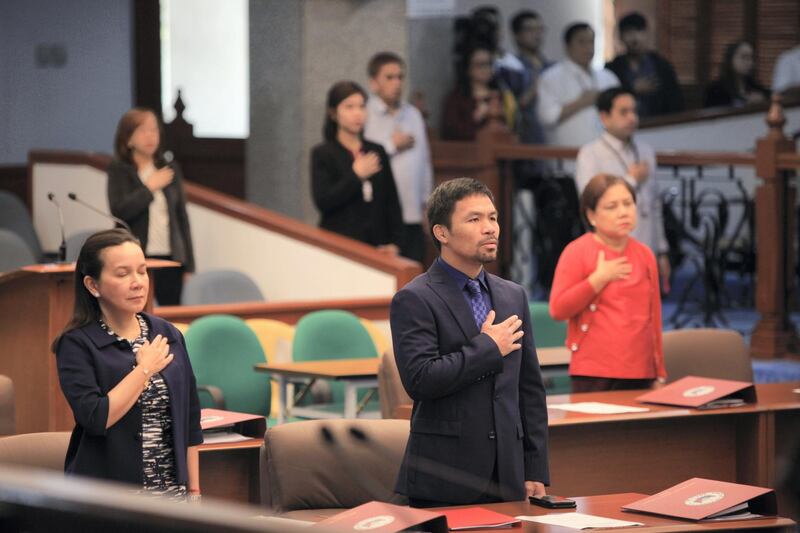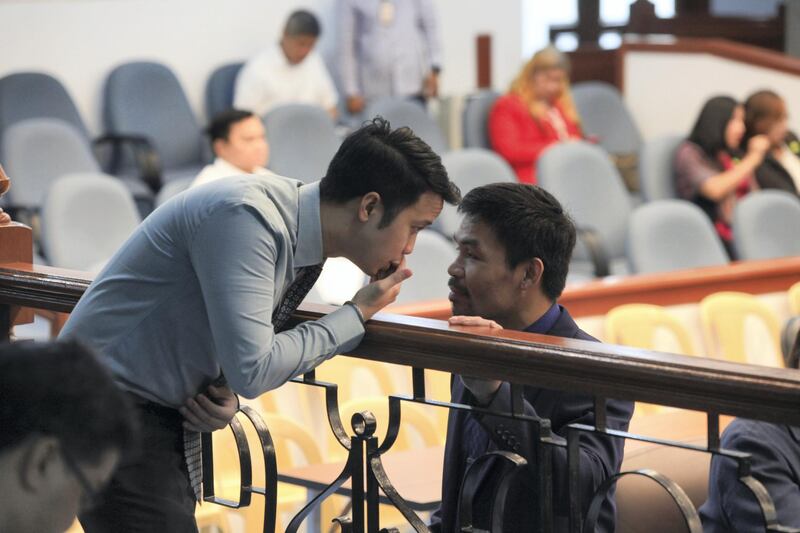They have been queuing since morning broke, some even earlier, faces hardened, hopes high.
Some are maids, some are gardeners, some are nurses and some are street sweepers. Some are simply companions of the labourers above.
But here they wait, from 5am and a little later, for the man to emerge. Word has spread from the previous day that the man behind the high-gated wall in this plush part of Manila, the man who despite the insular wall feels like one of them, has gifted “blessings” to those who sought them.
It is close to Christmas, and for the maids and gardeners and nurses and street sweepers who parallel the 10-foot concrete wall and disappear into the distance, the promise of 1,000 pesos (Dh70) is too good to pass up. Three times your daily wage can entice weary bodies from beds.
The man then emerges from his home, surrounded as always by his coterie of confidants. He stretches, adjusts his dark, angular sunglasses and fixes his headphones, nods to those around him, then departs for another 7am jog, trailed by those determined enough to keep pace. Some staffers stay behind to gift the blessings. Some manage the crowd as they troop in, faces softened, hopes sated.
The man is not there to witness it, but he has experienced it all before. The hardship, the hunger, the hankering for a better life. He has clambered clear of deep destitution to become perhaps the most popular figure in the Philippines. He is known around the world as both a record-breaker and history-maker.
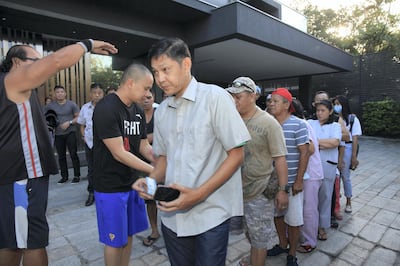
And there you see it, on a breathless mid-December morning in Manila, part of the man’s allure, a reason for the reverence. The magnetism of Manny Pacquiao.
That pull is evident the previous night, too. It is a little after 7pm inside a second-floor ballroom at the Makati Diamond Residences in Makati City, one of the more sumptuous spots in central Manila. As has become custom these past couple of years, in his position as one of the Philippines’ 24 elected senators, Pacquiao is throwing a Christmas party for his 53 office staff and their families. Soon it will feel like half the city has huddled around the eight circular tables blanketed by neat, white table clothes.
The one bedecked in red, stationed front and centre and with the best view of the band that will soon croon through 1980s cover songs on stage, is reserved for the evening’s star attendee.
The night begins with a prayer. Put forward by the lady holding the mic, the one sporting an identical Manny Pacquiao T-shirt to the one worn by her husband and daughter parked around a table toward the back, it concludes with: “Thank you God for giving us Senator Manny Pacquiao, an instrument of your peace, of your love, of your service.” Everyone offers a unified “Amen” and settles into their chairs.
Pacquiao is not here yet, even though it is now well past 8pm. Maybe he has been swallowed by the suffocating traffic that clogs Manila. Maybe he has been consumed, finally, by the near-ludicrous act of juggling commitments as a world champion boxer and a politician.
Or maybe he has simply spent some additional time getting ready, for when Pacquiao emerges through the room’s double doors to pooled applause at half-past the hour, he has seldom looked more dapper. Dressed in a navy-patterned three-piece suit, navy tie and crisp white shirt, the senator has furnished his outfit with a matching trilby with brown trim. Certainly, a Filipino Frank Sinatra could carry a tune tonight.
Pacquiao, though, resists the repeated invitations to sing, despite his famed love of karaoke. As the night unspools and the band revels in his presence, a steady wave of selfies are requested and always accommodated. The lady with the mic and the husband and the daughter get their T-shirts autographed, the star attendee scribbling just below his cartooned face, next to a grid filled with text proclaiming: “Senator, Servant, Leader. Compassion, Humility, Excellence, Integrity. Believe, Dream, Inspire, Unity. Stamina, Speed, Style, Champion.”
It is a nod to his dual roles. His charisma, also.
Pacquiao is the only eight-division world champion the planet has ever seen. But he is a senator now, charged with serving his public, tasked with making life more livable for the 16 million who voted him into office in 2016 and others who, almost inexplicably given his broad appeal, did not.
Some wanted Pacquiao to shun politics altogether. The widely held consensus is that politics in the Philippines, like too many other places, is a devious and disreputable pursuit. Concerns were that, should he become entangled in such a charade, Pacquiao could slip from his pedestal.
Or that the boy who grew up in a village called Barangay Tango on the island of Mindanao, then decamped with his mother and three siblings to General Santos, who scraped and scratched simply to exist, who stowed away at age 15 on a boat to sail 800 kilometres north to Manila purely to hone his aptitude for boxing, who slept rough and sold food in streets even though he had none to fill his own stomach, would represent nothing more than an instrument to curry favour among those with similarly execrable backgrounds.
_____________
Manny Pacquiao beyond the ropes:
Part 2: Turning 40 and no signs of slowing
Part 3: The final chapter - Broner, Mayweather and the fear of going on for too long
_____________
Pacquiao, 40, has fought for a better life, by any definition of the word. He has contested almost 70 professional boxing matches, battling and beating down numerous champions of the sport. Now he is here, fighting for genuine change in his country.
At the Christmas party, as Pacquiao sips on water and poses for those selfies, at times he looks as if the weight of expectations hangs heavy. Often he appears expressionless, like when the night escapes into karaoke, everyone filled with festive cheer except the man everyone’s there to embrace.
Maybe the long days and dual roles are taking their toll. Perhaps, Pacquiao’s mind has wandered to the basketball court, where he spent the night before, when he ran and jumped and shot through four full games, each one comprising 12-minute quarters.
He is one month from a world title fight against Adrien Broner, the mercurial but menacing American, at the MGM Grand in Las Vegas. It marks Pacquiao's return to a US ring after a two-year hiatus.
Still, it feels a long way from the present. Surrounded by his senate staff as the buffet disappears and the hum rises, Pacquiao dispenses bundles of 1,000-peso notes to those who belt out pop songs, or to the band’s lead singer, who look positively humbled by the gesture. Another stack is handed to a group of adorable children, who line up along the stage and perform a crowd-pleasing routine. Each time, Pacquiao counts out the bills below the table. Each time, the grateful recipients smile as wide as they have for a while.
There are other gifts, as well. Someone leaves with a hefty, curved Xtreme television, one of the companies for which Pacquiao serves as ambassador. At the raffle that closes the evening around 11pm, another shrieks at walking away with 50,000 pesos. Another thrusts his arms in the air, having just won a motorcycle.
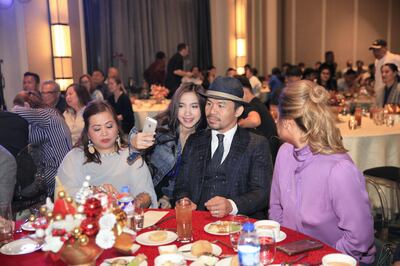
Minutes before, the man known affectionately as “Sen”, holds court. For the first time, the room falls silent. There, Sen speaks of the endeavours through 2018, of the bill to support overseas Filipino workers, of the push to raise the excise tax on tobacco. He is one of the few senators to challenge the tobacco lobby.
There, Sen outlines the agenda for 2019, of the need for greater commitment, of a doubling down on their actions, of the bills that have to be prioritised and pushed through. He references alleviating the exasperating daily traffic that chokes Manila. It is clear his political position is anything but ceremonial shadow boxing.
Sen is both authoritative and charming, punctuating his speech with jokes, tossing playful jibes at receptive members of staff. Each elicits a wail of approval. There, the audience hangs on his every word, smartphones capturing the moment for posterity.
His evening drawing to a close, Pacquiao signs off by wishing everyone a Merry Christmas and a Happy New Year, thanking them again for their commitment to the collective cause. He departs, still granting the odd selfie, ushered downstairs and toward home, towards another taxing new day.
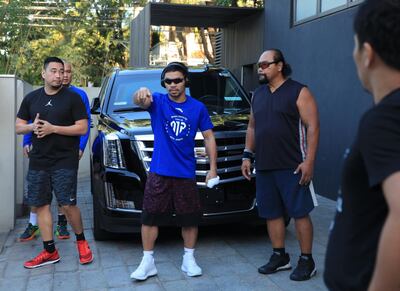
Standing in front of the smartphones and the smiling faces, Pacquiao appears perfectly at ease, just as he does the following morning, once his 7am jog and his hour-long stretches are complete; once his black Cadillac Escalade, the one with the fire-engine sheen and miniature boxing gloves that dangle from the rearview mirror, has laboured through Manila and settled at the senate building.
Inside the pine-panelled legislative chamber, after the prayer and the national anthem, Pacquiao sits in a dark blue suit – the trilby has not reappeared – and listens to the day’s programme being confirmed. He reads through the various documents on his desk, dishes out sweets to colleagues and, during the break in session, watches a video on another senator’s smartphone. Pacquiao chats and smiles and jokes.
Clearly, he is comfortable among this company as well, despite the extremely divergent paths to politics. Most of his peers were born into political families, sons and daughters of former senate presidents. The current chief, Tito Sotto, has a background in music and television.
During the next three days, Pacquiao’s time will become as plugged as Manila’s Edsa Street, where even ambulances, sirens bawling and lights blazing, get mired in the mechanical mud. His training for the January 19 joust with Broner will suffer. It is repeatedly delayed, sometimes cancelled.
For three days, before the senate session shuts down for Christmas and stalls until midway through the next month, Pacquiao will be occupied by endless deliberations regarding next year’s budget. He will contribute to crunch negotiations, help chart his government's course through 2019. Earlier this year, Rodrigo Duterte, the Philippines' controversial and hardline president, championed Pacquiao as his potential successor.
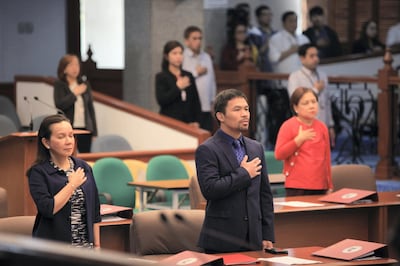
How much the budget discussions impact the people in Tondo remains to be seen. Manila’s largest slum, said to be one of the most densely populated plots in the world, is rife with stray dogs and children who cannot afford the basics to attend school. Youngsters sift through mounds of garbage, convene on makeshift basketball courts and direct traffic through the narrowest of alleys, eyeing a quick reward from motorists.
Roniel is one of the street urchins, a slip of a boy somehow age 13, standing along the edge of Manila Bay despite the nauseating stench rushing off it, in his worn San Antonio Spurs jersey and head burning with curiosity. Foreigners don’t frequent this part of the capital, but when they do, Roniel is compelled to ask if the Westerner currently before him, of average size and build, could be as tall as LeBron James.
As ever, Pacquiao still towers above all. Roniel recounts when Pacquiao landed the previous year, in a helicopter not far from the water, and doled out blessings to whoever reacted quickest to his impromptu arrival. Soon, he was swamped. It happened to be campaign season, but those close to Pacquiao insist he is fuelled by a legitimate desire to help those less fortunate, to give back. He is a million miles and more from that sort of life now, but he has been there before. He recognises the hardship and the hunger.
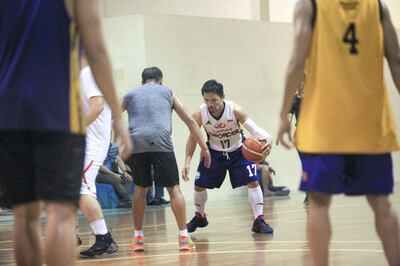
Pacquiao’s philanthropy transcends street-level generosity. His money has provided homes and housing lots to thousands in Sarangani Province, from whence he hails. He has contributed substantially to health care and education in Mindanao. Once, upon growing exacerbated by the plight of fishermen in General Santos, he sought to equip their boats with outboard motors, to ease the burden and bolster business.
It is estimated that Pacquiao has donated around half of the US$500m-plus (Dh1.83 billion) he has earned from boxing. At various times in the past, former promoter Bob Arum and current trainer Freddie Roach have aired concerns that he will one day end up penniless.
Back in Tondo, where he handed out those thousand-peso notes the previous year, Roniel and friends marvel at the day Pacquiao dropped into their hardscrabble lives. Eyes wide, they describe him as “strong” and “handsome”.
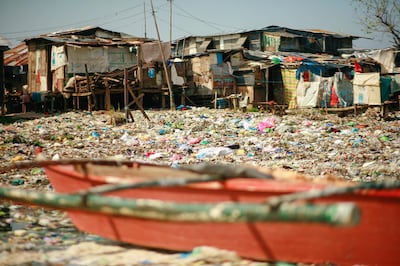
Wherever you are, be it outside his home, among his senate staff, in Tondo or the Elorde Gym where he has been preparing for Broner, the regard for Pacquiao radiates. He is not just the boy who did good, or even great. His story is truly extraordinary. It confounds and it connects.
Sure, Pacquiao might reside today in Dasmarinas Village, alongside politicians and other celebrities. He enjoys impressive accommodations, with those high-gated walls on Mahogany Road. But his journey has been tougher than teak. For a large portion of the population he serves today, he is a light amid the raging darkness, a symbol of manifest Filipino fortitude.
It is possible that his contribution is greater than the largesse borne of his two vocations, more impactful than the piles of pesos he distributes to his countrymen or the laws he hopes to enact. Maybe that’s the magnetism of Manny Pacquiao. That, when all is said and done, he simply gives hope to an inherently hopeful people.
